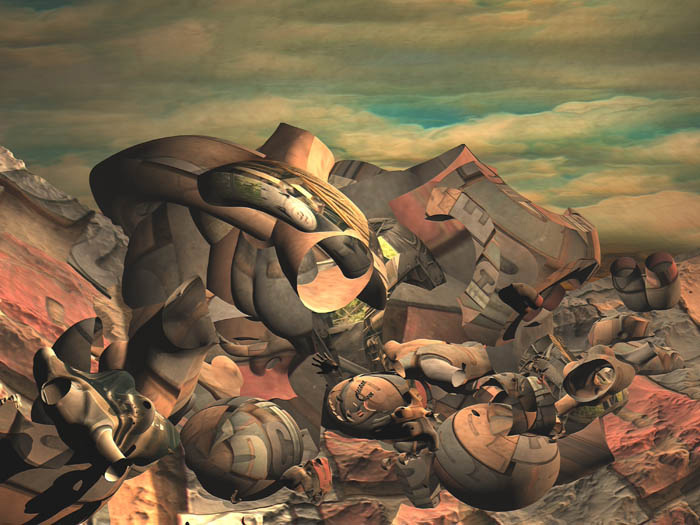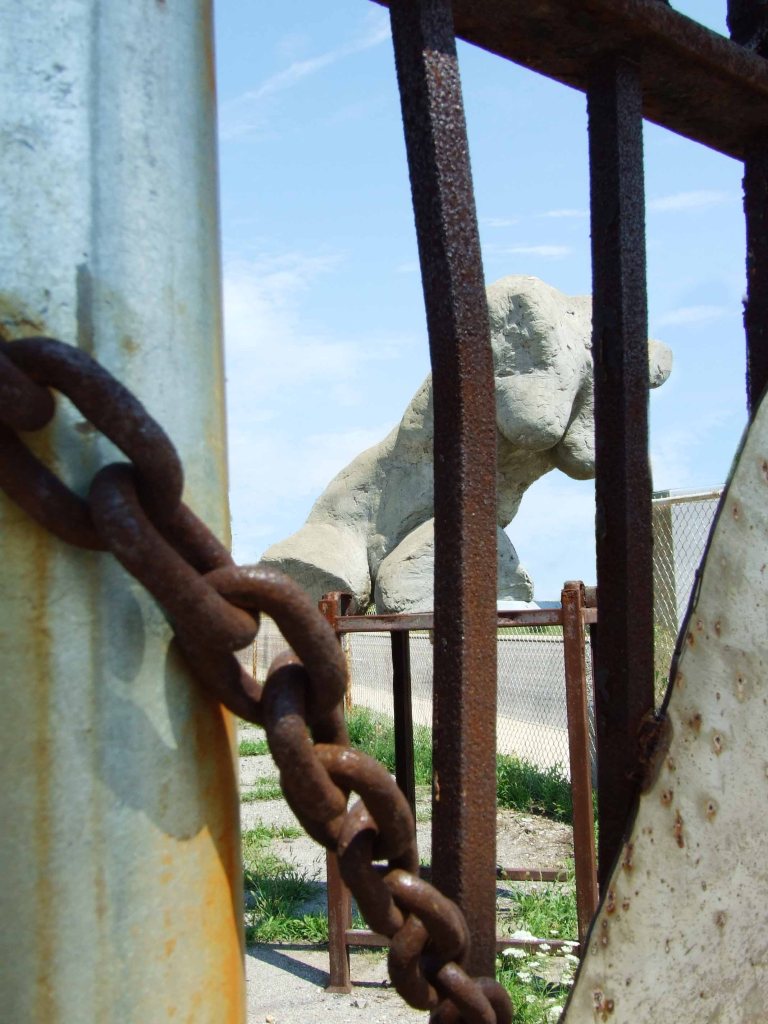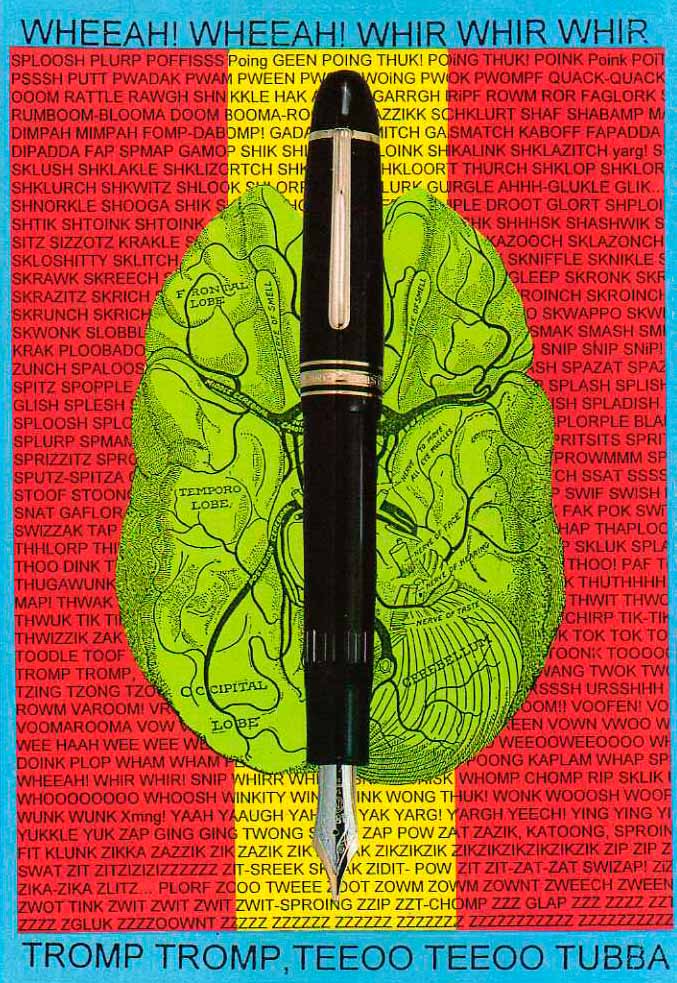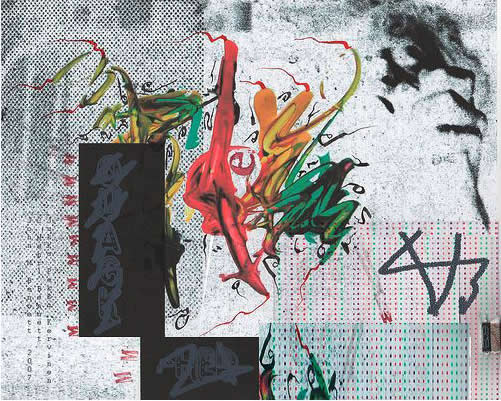
Volume 3, Number 1 2010
Kyle Hemmings
LAST CHANCE FOR HAPPINESS
Van Gogh had an estranged wife.
Kept her a secret even from Theo.
Hid her in his mother’s Chinese vase
of wilting lilies or in a closet of starry nights.
Pressed his ear to the door
and heard post-impressions of love. She cooed.
He answered. She said make me real
from a distance. He said up close I am so needy
and I need a good shave
with a steady hand. Listen, she said. And he
heard the ocean, the wistful rustlings
of his childhood near wheatfields
and ruined corn. She grew silent. He smiled
and listened with his good ear.
He never gave up hope until he opened
the door and heard her speak with his
own words from last night’s dream. He impregnated her
with seashells and the ocean rose and swirled
bore him demon children in gun metal gray.
LAST CALL
In the street, the drunks mock Last Call,
dirty dance against meager traffic
then return to their lives of constant hangover
and mid-morning skeletons. I turn to my new
lover, a girl with perfect teeth and razors
in her eyes. She says she knows an after-hours
spot where we can grow numb and never sober.
Baby, I say I only got a bad heart and loose change,
just enough for one song about broken wings
and stretched-too-thin lies. It’ll do she says.
She’s a cheap date but a costly lay.
In the bed of night where there’s a constant
turnover of housekeepers, she’ll say she wants more
but I’ve already disappeared into the
Hobroken of middle-age stamina,
irregular bus schedules.
On my tomb it will read:
They only accept exact change.
Peter Ciccariello

Peter Ciccariello is an artist, poet, and photographer. His work has appeared in such places as MOCA The Museum of Computer Art, Oregon Literary Review,
The Long Island Quarterly, and Otoliths. His book Imaginal Landscapes, an experiment with the poem in landscape as it relates to poetic geography was published by Xexoxial Editions. He lives in Providence, Rhode Island.
Kyle Hemmings
THE LAST DAY
On my last day in vivo, I treated myself to a banana split
with walnut topping at the Kool Queen, then, bought three pizzas
with sausage and pepperoni and lemon meringue pie at the A&P.
I bought a carton of cigarettes at the deli on Haymarket, shot the breeze
with the Indian owner whose smile always betrayed the wide gap
between the front teeth, and paid for the cigarettes with a hundred
dollar bill. I was feeling flighty and disingenuous. Perhaps like
Holly Go Lightly if she were a man. After all, today I was going to die.
When I returned to my apartment, I sat on the couch, me-so short
of breath from the walk. I didn’t rearrange anything, nothing to pack
or unpack. Rather than thinking of all that I could have done better,
all my losses and miscalculations, I took stock of all that I enjoyed—
crimson sunsets, the fine curves of a young girl, the morning mist
at Edgewater Park. Was it enough to miss this world? To sustain me?
I couldn’t conclude anything. I had lived most of my life skirting
the perimeters rather than being engaged. Much like a bulging-eyed
Beagle on a leash. He wants so much, but his reach is too short.
Before everything turned completely black, my trapped-in-a-closet self
stepped out. My perspective shifted. I now watched my body lean forward,
crumble to the floor, the arms and neck so slack.
I thought if there is a heaven, it’s where I always thought it was:
The Crazy Diamond Tavern, where I’d corral with the old guys,
the janitors and schoolteachers, the hustlers and the hustled.
The bartender on the day shift was always God the Father
and Jesus worked the second shift. Happy Hour would last an eternity.
I will walk in and bathe in the aromas of cigarette smoke,
unwashed flesh, a woman’s cheap perfume that she calls
rosewater, but another would call putrid orchid.
I will imagine the taste of flat beer, but no one will ever
defy God the Father, the master of pouring glasses
of half-foam. I will shout out, “Hey, listen up.
You’re all a bunch of useless drunks!”
And the most beautiful thing about entering heaven
is that no one on earth can hear you.
Kyle Hemmings lives and works in New Jersey. His work has appeared in such publications as Ophelia Street, Prick of the Spindle, Rumble, and Silk Ink Press.
Valery Oisteanu
BEAT ANGEL BLUES
TO HAROLD NORSE
The cosmic hustler is now a pure spirit
And so are the masters of the Dream-machine
Norse continues to whisper from the great beyond
Howling, and writing the story of his crazy karma
O! Hollow America! Hollow America
The harder one hits, the deeper the sound
In the passage underground
The virtual museum of the Beats
They who have forgotten you so soon
Omission accomplished
Tears drop as red petals off a rose
All roses cry, I wanna die! I wanna die!
There are no degrees of separation
Between him and Ira Cohen
Between him and Leonard Cohen
Between Corso and Norso
His ghost still haunts the island of Hydra
Sex and Marijuana evenings with Zina
Her spirit reincarnated in Harold
Where he performs in the Café Purgatory
For the hip elite of the Generation Beat.
ARSHILE GORKY TALKS WITH JACKSON POLLOCK
Let the black birds fly as miraculous as handwriting
Let the paint fly in the rhythm of Charlie Parker
Working from the heart, painting day and night
Canvases on the floor, canvases on the wall
Surface virtuosity of paint and movement
Rhythm and pause sequencing and destroying
Horizontal murals spinning into chaos
He throws the paint in the rhythm of jazz
He throws the paint with a stick and a brush
Many try to kidnap him
Many try to love him
But Lee Krasner saved him
The she wolf perishes in flames
The totem is the guardian of the secret
The white angel dances into the blue unconscious
Arabesque dream meets troubled queen
These are the titles of Jackson’s work
Peggy Guggenheim tried to seduce him
Siqueiros tried to influence him
Alonso Ossorio and John Graham got drunk with him
But Lee Krasner saved him
Sounds in the grass, vortex full fathom
Out of the Web Echo are his last paintings
Before driving into the eternity
Followed by the Lucifer.
Valery Oisteanu was born in Russia and educated in Romania. He adopted Dada and Surrealism as a philosophy of art and life. His work has appeared in such publications
as Exquisite Corpse, The Pedestal Magazine, Big Bridge, and Evergreen Review. He lives in New York, New York.
Mary Ellen Derwis

Mary Ellen Derwis lives in Brecksville. Ohio. Her work has appeared in such publications as Otoliths, Oregon Literary Review, Bosphorus Art Project Ouarterly, and Unlikely 2.0.
Ruth Foley
KNOWLEDGE
Would-be informer, what will you
tell us now? What knowledge left
your head that night, when you were
forced to kneel behind the Mavis T. Blatchett
Elementary School? Eleven years
your mother waited for her own
knowledge, waded through the flood
of muddy memories and false eyewitnesses:
I saw her buying cigarettes in Abington.
She got her boobs done.
She dances at Cheetah’s on the state line.
Your mother knew you
weren’t perfect. Your mother knew
you weren’t her baby girl.
And soon enough, the crazies
stopped calling the tip line. Soon
enough, your father stopped
slowing down each time he passed a girl
with long brown hair, leaning
in a doorway in Kenmore Square,
a cigarette held in her mouth,
a proposition he couldn’t bear
to contemplate. No parent wants
to think their child can end this way—
knees down in the dirt, maybe
whispering a half-forgotten prayer,
maybe making an offer.
Whatever you saw, it was enough
to take the Family down,
so you went down instead, a stray piece
of cellophane stuck to one crocodile
high-heeled shoe, the other on its side
in the grass behind you. You fell.
The man who took you dropped you
back into the earth face-down
so he wouldn’t have to close your shadowed
eyes against the dirt he lay down
after you. So he wouldn’t have
to touch you again. So he wouldn’t
have to watch you watching him.
And you—your knowledge bleeding
through the spaces between pebbles
and dirt, turning the dust to something
thicker than mud or blood alone,
your favorite pink blouse
rucked halfway up your back—
you didn’t know the difference
and didn’t care by then. And if a child
young enough to be the son
you might have had—if that child
hadn’t missed an easy out fly ball
at recess on a false-spring
November morning, hadn’t found
some bones that looked like
fingers, well. Then we’d know
even less than we do now.
MAN PRETENDING TO FALL OFF BRIDGE ACTUALLY FALLS
AP headline
It’s not as funny as it sounds. One minute you’re flying—
two or three too many Jim Beams—looking over your shoulder
at your new girlfriend, some woman you think
you might love eventually, or maybe not, but she’s good
enough for now. The night is clear and starting to warm,
and your girl’s been warming up all night, putting her hand
on your thigh under the table or pressing against you
when you put your arms around her while she pretends
she doesn’t know how to shoot pool and you
pretend you want to teach her. And last call came up
and you were out of money anyway and the bar
was getting smoky and stale with desperation (but not
you, not the girl, because you’d already sealed
that deal a couple of nights ago, and she’s yours now
until you get bored or mean on liquor or
both) and you stumbled out into that almost-summer
Thursday night and blinked a little at the headlights
in the parking lot and the way the stars
had set themselves to spinning. And you drive
with the windows down to keep yourself awake—
it might not be winter, but it’s still cool enough for that—
your girl with her shoes off, her feet propped
on the dash, her head rolling a little on your shoulder.
And you’re not even halfway home before you have to
take a piss, and the bridge seems good, you can water
the marsh grass with a little spring rain of your own.
Your girl is laughing, and you turn your back,
even though you’ve got nothing she hasn’t seen before
and she’ll see it again later if you’ve got anything to say
about it. You’re flying, I tell you. They don’t make
nights better than this, not where you come from.
And you make some kind of whoa sound, spin your arms
like you’re losing your balance, laugh like
the idiot you are, and that’s all right, that’s fine, she’s
laughing, too, she hasn’t stopped laughing, but you look
over your shoulder to catch her eyes, to see her throw
her head back, to make sure she knows how funny
you are, and then you’re really flying, the night falling
away as you rush towards the reeds and you don’t even have
time to think about it all until later. In the moment,
it’s all piss and air and a laugh turned into some kind of gasp
you’ve never even heard before, and a cry comes
to your ears, a cry like a hunted animal or a lost child,
and it’s a moment before you realize it’s you,
you’re howling into the wind your falling makes.
And when you wake—and you do wake—the girl
is gone, because, she says, she wants a man
with half an ounce of common sense, but you know
what she means is that she wants a man who’s whole,
who can feel his feet against the ground, whose thigh
she is unafraid to touch. She wants a man who can make
her promises, even if he has no plans to keep them.
Ruth Foley lives in Attleboro, Massachusetts. She teaches English at Wheaton College. Her work has appeared in such publications as River Styx, Oxford Magazine,
The Comstock Review, and Confrontation. She is the Associate Poetry Editor for Cider Press Review.
Larry Smith
TU FU ENTERS THE CLEVELAND PUBLIC LIBRARY
They didn’t need me today,
said Old Ed could handle things—
few customers, but I know too
it’s to keep me from full-time
and collecting benefits.
Yet they wait till I show up,
so I stand here in early light
waiting for Bus 10 to take me home.
An old woman standing near
looks over at me and speaks,
“I clean for people out in Shaker.
How about you?” She’s dressed warm
in what they call a Pea coat,
her brass buttons shining in street light.
“I do dishes at Ming’s, but
today they don’t need me,” I shrug;
she nods, knowing the way it is.
I stare out across Superior as
lights come on in the long gray building.
“That’s our library,” she says,
and her words hang in the air
as a gush of traffic passes.
I stare at the grand doors,
then find myself crossing,
climbing the broad stone steps.
I enter the quiet space
passing under the watchful eyes
of a blue uniformed guard,
and into a huge dome,
arches over every door and window.
I carry nothing to check,
only my pocket notebook
where I scribble my poems.
A woman in a blue suit smiles.
“You’re our first customer today,”
she says. “May I direct you?”
And I think to say: “Literature—Chinese.”
“That would be our second floor,
up that stairway.” I bow slightly
and walk to the marbled steps,
a huge painting spread before me.
In such space and richness
I feel both large and small.
I climb, then enter an archway
to a room as wide as a field.
Lost among shelves of books,
always my friends and guides,
I am stranger again in a city of words.
I pass the dim blue light
of computer screens, finding my way
down marked streets of bookshelves
till I come to “PJ”—my poetry homeplace.
My hand skims the textured wall
of books of varied colors.
I smell the glue of aged pages.
and would choose them all—
devour them there among the stacks.
The world dissolves outside the windows.
On a stool I feed for hours
take down old Lao Tzu…
As darkness lightens,
murky comes clear,
and stillness moves.
At noon I take out my pen.
Larry Smith is a novelist, poet, reviewer and editor. He directs Bottom Dog Press. Recent work has appeared in McGuffin, and The Cortland Review. He lives in
Huron, Ohio, along the shores of Lake Erie.
Carol Stetser

Carol Stetser is a visual poet living in Sedona, Arizona. Her work has appeared in such publications as Vispoeologee and Rampike. This print is part of the collection
Mad Comix using words by Mad Magazine cartoonist, Don Martin.
Tim Kahl
SCRIPT OHIO
Oh, you ore boats from over in Lorain,
awakening the question of beyond in the lake.
The mills of Cleveland and their Youngstown brothers
leap to make the steel rails and trestles.
The jagged lines of cement tossed across
the cathedrals of wheat and soybeans etch
a cursive glyph into the earth. The tired flow of blood
through the canals climbs the tiers of the heartland,
the old towpaths running alongside like
shadows accenting italics. Yet where did
the interurbans go that ran between Dayton
and Cincinnati. They went the way of wagon ruts
pressed into Zane’s Trace, the way of passengers
on steamers charging up the river.
The aromas of the eras start to mark the plains
with destinations. The paths expand,
and the grass is trampled into waysides.
There the travelers stop to see what the cloud seed
will rain down in the future. The rivulets
inscribe the name of the state in the clay;
the turnpike throws off new asphalt shoots,
every tendril a letter. And the band plays on,
blaring Across The Field, championing its
victories. The o’s circuit is complete.
The dot on the i is where you are now.
THE WESTERN RESERVE
Cuyahoga fever thinned the ranks of the surveyors
whose lines squared the interests of men in
Connecticut. Their maps were made from sideways
glances at the stars. Then came the settlers to gash
the first fields after columns of smoke were erected
and slowly evolved into air. Their frontier sons
were born with an ax in one hand and a gun in
the other, growing up through a tangle of trunks and
broken branches. They split rails for fences around gardens.
They believed the hearts of Carolina parakeets by
the stream were poison, and all jays went to
hell on Fridays. But the cardinals should nest near
the door of the cabin, and these were not meant for
hunting. They believed the hickory was a sign of
fertile soil. Flax seed grew well on burial mounds,
and flint could be found while digging up potatoes.
There was more and more sky to believe in,
more room in the landscape for liberty to be
debated. But as the market for wheat developed,
the argument increasingly grew one-sided.
The cradle scythes left a stand of stubble, and
the swamps were drained. The hogs devoured
copperheads with a flourish. The state seal featured
a canal barge moving past a field. All roads led to
the millers who were clearing their waterwheels of
driftwood. The rivers kept pushing the fallen bits further,
murmuring to the uninitiated back at the source of
the trade route in New England, Go west, young man, to Ohio.
More came and saw an empty place against
the Cuyahoga sky that they could have faith in.
At night the stars were clearly visible. The land was hope,
and the rest of the time their prayers kept them busy.
Tim Kahl lives in Elk Grove, California. His work has appeared in such publications as Berkeley Poetry Review, Prairie Schooner, Indiana Review, South Dakota Quarterly,
and The Texas Review. He is the author of Possessing Yourself (Word Tech Press, 2009). He grew up in Massillon, Ohio.
Martin Ott
REQUIEM FOR PLUTO
A small black orb is watching you
untraceable by the human eye.
Sometimes you feel there is a pinhole
boring through the sloping neck top,
exposing the frontal lobe to scrutiny.
You imagine the all-seeing gaze
of a dark-star deity guiding you.
You look for it from your favorite
coffee shop, staring at the same
street corner for a woman’s dress
to rise, drawn by gravity that should
not be. The day you saw him appear
through the bottom of your water
glass no one believed you found
the God of the Underworld strolling
your neighborhood but you had faith
in the power of things unseen.
Your waitress listens to your dreams
and dots your check with a circle.
You imagine a smiling face there
waiting to be eternally discovered.
Martin Ott is a freelance writer and a graduate of the Master of Professional Writing Program at the University of Southern California. His poetry and fiction have
appeared in such publications as Poetry East, Tampa Review, New Plains Review, The Literary Bohemian, and Valparaiso Poetry Review. He lives in Los Angeles, California.
Mara Patricia Hernandez

Mara Patricia Hernandez was born and raised in Guadalajara, Mexico. Her work has appeared in Other Cl/utter, Otoliths, The New Post-literate: A Gallery of Asemic Writing, and Noncessence: A Journal of Nevercheology. She lives in the San Francisco Bay area.
Jason Floyd Williams
poor, big-headed Charlie.
The conversation was a tributary, a Kerouac creek,
birthed from a previous chat about
downtown Cleveland & factory jobs.
Seems Janet’s dead sister, Dorothy, had
a handicapped son named Charlie.
“Charlie had a big head, the size of a
summer watermelon. And he was real slow.
Well, folks saw this and took advantage of him.
He was robbed and beaten in Cleveland.
Dorothy brought Janice back to Stringtown
after that.”
“Who’s Janice?” I asked.
“Janice is Charlie. After Dorothy found out
Janice was retarded, she named him Charlie.”
“Who names a boy Janice?
And makes life easier on him after she discovers
he’s handicapped and changes his name?”
“Well, Dorothy had strange names for
all her kids. She read ol, pulp Romance books.
So her last girl was Andy; the oldest girl
was Danny; and the oldest boy was Cindy.”
“Criminy, how many kids, with rotten names,
did she have?” I asked.
“Four kids,” Janet said.
“And many, many abortions.”
“Didn’t they have condoms or
sandwich bags in Stringtown?”
This caused Floyd, seated at my left, to spit
up his sauerkraut.
Seems like he’s recovered from the stroke.
A VidStar epilogue.
For Les & Staff,
Sometimes the victory of David
over Goliath is not so clear-cut.
Goliath may appear dead.
His lifeless body—like hoarded
mounds of lunch-meat—, a stone
beside his giant head (a runaway skin-mole),
& afterwards a crime chalk-line
that’ll keep the kids hop-scotching
for years.
David may feel secure.
He may settle down, get married.
buy a home in the country.
He may even open a video store,
renting out good ol classic films.
This might last awhile—
say 27 yrs.
In each increment of 5 yrs,
David thinks, “Well, it’s been a solid run,
but there’s competition popping up
all over.”
David endures, however.
He sees other ma & pa video stores
come & go, like Dust Bowl travelers.
Years pass.
Some tough & mean years, others
very profitable.
It pays to specialize, David thinks.
It also helps to have a good crew—
Joe, Shannon, Missy, Ed & others,
David reflects.
Part 2.
No one checked Goliath’s pulse, though.
His body disappeared.
His obituary was lost by
the editorial staff.
Goliath sought revenge w/ Ahab’s patience
& Madoff’s cunning—
He planned competition in the forms
of NetFlix (folks won’t even have to leave
their homes or, God forbid, interact
w/ sales clerks);
Red Box (those inflamed skin-tags protruding
through the landscape—again supporting & enabling
the xenophobes among us); the big corporate stores,
The Hollywood Videos, The Blockbusters,
w/ their vast square footage of
new releases & limited old selections
(forget about the grainy ol flics—
Goliath abhorred Bogart & Cagney—
embrace, w/ incestuous arms,
the CGI generation).
Part 3.
We were at my grandparents
the other day.
My grandfather’s drifting out
of this life one pound at a time—
something under the skin, something unknown
in his stomach, something interrupting
his appetite.
He was 175 lbs two months back,
now he’s 142 lbs.
We avoided talking about death
& the afterlife by watching TV.
We could only watch pieces of it—
our dogs would bark; the ol man
would have a coughing fit; someone
would comment about the snow.
The movie was called The Letterbox.
I forget the main character’s name,
but it’s about a dying woman
who has month-long relationships
w/ socially-boring, interpersonally awkward men.
Sara’s her name, now I remember,
(one fellow kept repeating it, while filling
out a crosswords puzzle: his mantra), &
she encouraged Mr. November or Mr. February
or Mr. Whatever-Month, to write sonnets
about her, to water-color
portraits of her.
She’s easy-on-the-eyes & a little goofy,
so all the men quickly do these things.
The psychological portions I gathered
about why Sara did this—
change men like menstrual cycles—
was explained by her neighbor,
some pro-vegetarian, sign-painter:
“She wants to be remembered.
She’s dying and she wants to live
on in memory.”
I guess that’s all we want—
to just be remembered.
Jason Floyd Williams lives in Cleveland Heights, Ohio. His poetry has appeared in such publications as My Favorite Bullet, The City, Nerve Cowboy, Cherry Bleeds, and
Opium 2.0.
John M. Bennett / C. Mehrl Bennett / Jukka-Pekka Kervinen

John M. Bennett has been published extensively and has exhibited and performed his word art in numerous venues. He is Curator of the Avant Writing Collection at The Ohio State University Libraries. He lives in Columbus, Ohio.
C. Mehrl Bennett is an artist and poet. Many of her images are imbedded with text. She often creates her art in collaboration with other artists. She lives in Columbus, Ohio.
Jukka-Pekka Kervinen is from Finland. His work has appeared in numerous publications.
Timothy Pilgrim
FENCING IN DARKNESS
To begin, a list. One, sword,
pointed, thin. Two, mask
with mesh, dark, tight. Three,
wire, barb strands twisted sharp.
Four, counselor, priest,
confessor, friend. Someone
to deal with tears, excuses,
lift spirits up again.
Five, light, bright,
so nothing hides.
To stay alive, survive,
make backup plans of plans.
Re-read Plath, Frost, Jung.
Recite “Mending Wall” by moon
or in full sun. Know what
must die, let live again.
Learn to stab, feign, sway.
Drive point home in dusk
then in day. Practice blindfolded,
eyes squeezed shut. Dream
at night, knees curled to chin.
Shun mirrors in life;
learn fencing well, others out,
yourself in. Know
if you are suffocating,
or dueling death again.
Timothy Pilgrim is a journalism associate professor at Western Washington University. His work has appeared in such publications as Seattle Review, Quaint Canoe,
The Curious Record, and Bathyspheric Review. He lives in Bellingham, Washington.
Ross Vassilev
UPPER EAST SIDE
I went to a racially mixed
school in New York.
a lot of the black kids
never did their homework
cuz they didn’t want
to be seen as acting white.
the black kids and the
Pakistani kids hated
each other while the Mexican
kids talked to each other
in Spanish and minded their
own business.
I spent most of my time
stepping on caterpillars.
no one told me
they turn into butterflies.
Ross Vassilev was born in Bulgaria. He is the editor of Opium Poetry 2.0. His work has appeared in such publications as Word Riot, My Favorite Bullet, and Strange Road. He lives in Delaware, Ohio.
13 MILES FROM CLEVELAND
Edited by Joe Balaz
Joe Balaz lives in northeast Ohio in the Greater Cleveland area. He edited Ramrod–A Literary and Art Journal of Hawai’i and was also the editor of Ho’omanoa:
An Anthology of Contemporary Hawaiian Literature.
All works appearing in 13 Miles from Cleveland are the sole property of their respective authors and artists and may not be reproduced in any way or form without their permission. © 2010
